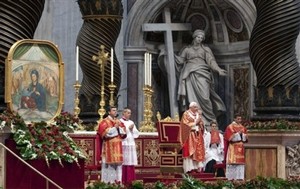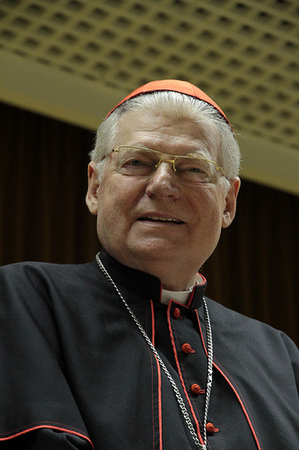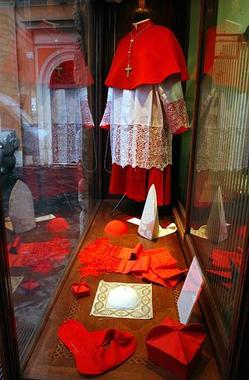 Today we celebrate the great solemnity of Pentecost. If, in a certain sense, all of the Church’s liturgical celebrations are great, this one of Pentecost is so in a singular manner, because, arriving at the 50th day, it marks the fulfillment of the Easter event, of the death and resurrection of the Lord Jesus, through the gift of the Risen Lord’s Spirit. The Church has prepared us in recent days for Pentecost with her prayers, with the repeated and intense plea to God for a renewed outpouring of the Holy Spirit upon us. The Church re-lived in this way the events of her origins, when the Apostles, gathered in the cenacle in Jerusalem “were perseverant and united in prayer together with some women and Mary, the mother of Jesus, and his brothers” (Acts 1:14). They were gathered in humble and confident expectation that the Father’s promise communicated to them by Jesus would be fulfilled: “Before long you will be baptized in the Holy Spirit … you will receive the power of the Holy Spirit, who will descend upon you” (Acts 1:5, 8).
Today we celebrate the great solemnity of Pentecost. If, in a certain sense, all of the Church’s liturgical celebrations are great, this one of Pentecost is so in a singular manner, because, arriving at the 50th day, it marks the fulfillment of the Easter event, of the death and resurrection of the Lord Jesus, through the gift of the Risen Lord’s Spirit. The Church has prepared us in recent days for Pentecost with her prayers, with the repeated and intense plea to God for a renewed outpouring of the Holy Spirit upon us. The Church re-lived in this way the events of her origins, when the Apostles, gathered in the cenacle in Jerusalem “were perseverant and united in prayer together with some women and Mary, the mother of Jesus, and his brothers” (Acts 1:14). They were gathered in humble and confident expectation that the Father’s promise communicated to them by Jesus would be fulfilled: “Before long you will be baptized in the Holy Spirit … you will receive the power of the Holy Spirit, who will descend upon you” (Acts 1:5, 8).
In the Pentecost liturgy, corresponding to the narrative of the Acts of the Apostles of the birth of the Church (cf. Acts 2:1-11), is Psalm 103, which we heard: a praise that goes up from all creation, exalting the Creator Spirit, who did everything with wisdom: “How many are your deeds, O Lord! You have done them with wisdom; the earth is filled with your creatures … may it always be the glory of the Lord; may the Lord rejoice in his works” (Psalm 103:24, 31). What the Church wishes to tell us is this: The creator Spirit of all things, and the Holy Spirit whom Christ had sent from the Father to the community of disciples, are one and the same: creation and redemption belong reciprocally to each other and they constitute, in their depths, a single mystery of love and salvation. The Holy Spirit is first of all the Creator Spirit and so Pentecost is the feast of creation. For us Christians the world is the fruit of an act of the love of God, who made all things and who rejoices in them because they are “good,” “very good,” as the account of creation states (cf. Genesis 1:1-31).
Thus God is not totally Other, unnamable and obscure. God reveals himself, he has a face, God is reason, God is will, God is love, God is beauty. The faith in the Creator Spirit is the faith in the Spirit whom the risen Christ bestowed upon the Apostles and bestows on each one of us; they are therefore inseparably joined.
Today’s second reading and Gospel show us this connection. The Holy Spirit is he who helps us recognize the Lord, and he makes us pronounce the Church’s profession of faith: “Jesus is Lord” (cf. 1 Corinthians 12:3b). “Lord” is the title given to God in the Old Testament, a title that in the reading of the Bible took the place of his unspeakable name. The Church’s Creed is nothing more than the development of what is said with this simple affirmation: “Jesus is Lord.” St. Paul tells us of this profession of faith that it is from the word and work of the Holy Spirit. If we want to be in the Spirit, we must adhere to this Creed. Making it our own, accepting it as our word, we acquiesce to the work of the Holy Spirit.
The expression “Jesus is Lord” can be read in two senses. It means: Jesus is God, and at the same time: God is Jesus. The Holy Spirit illuminates this reciprocity: Jesus has divine dignity, and God has the human face of Jesus. God shows himself in Jesus and with this conveys to us the truth about ourselves. The event of Pentecost is letting ourselves be deeply enlightened by this word. Reciting the Creed we enter into the mystery of the first Pentecost: There occurs a radical transformation in the chaos of Babel, in those voices that vie against each other: the multiplicity becomes a multiform unity; from the unifying power of Truth comes growth in understanding. In the Creed that brings us together from the four corners of the earth, which, through the Holy Spirit, does this in a way that permits understanding even in the midst of the diversity of languages, through faith, hope and love, is formed the new community of the Church of God.

The Gospel passage offers us a marvelous image to clarify the connection between Jesus, the Holy Spirit and the Father: the Holy Spirit is represented as the breath of the risen Jesus Christ (cf. John 20:22). The Evangelist John borrows an image here from the account of creation, where it says that God breathed into man’s nostrils a breath of life (cf. Genesis 2:7). The breath of God is life. Now the Lord breathes into our soul the new breath of life, the Holy Spirit, his most intimate essence, and in this way we are welcomed into the family of God. With baptism and confirmation we are given this gift in a specific way, and with the sacraments of the Eucharist and penance it is continually repeated: the Lord breathes a breath of life into our soul. All of the sacraments, each in its proper way, communicate the divine life to man thanks to the Holy Spirit who works in them.
In today’s liturgy we see another connection. The Holy Spirit is both Creator and the Spirit of Jesus Christ, in a way however that the Father, Son and Holy Spirit are one single God. And in light of the first reading we can add: The Holy Spirit animates the Church. She does not derive from the human will, from reflection, from man’s ability and from his capacity to organize, because if this were the case, she would have already been extinct for some time, just as every human thing passes. She is rather the Body of Christ animated by the Holy Spirit. The images of wind and fire, used by St. Luke to represent the coming of the Holy Spirit (cf. Acts 2:2-3), recall Sinai, where God was revealed to the people of Israel and he granted them his covenant; “Mount Sinai was covered in smoke,” we read in the Book of Exodus, “because the Lord had descended upon it in fire” (19:18). In fact Israel celebrated the 50th day after Passover, after the commemoration of the flight out of Egypt, as the feast of Sinai, the feast of the Covenant. When St. Luke speaks of tongues of fire to represent the Holy Spirit, the ancient covenant, established on the basis of the Law received by Israel on Sinai, is recalled. Thus, the event of Pentecost is represented as a new Sinai, as the gift of a new covenant in which the alliance with Israel is extended to all the peoples of the earth, in which all of the barriers of the old Law crumble and its holiest and immutable core appears, which is love, that precisely the Holy Spirit communicates and spreads, the love that embraces all things. At the same time the Law expands, it opens while remaining more basic: It is the New Covenant that the Holy Spirit “writes” in the hearts of those who believe in Christ. The extension of the Covenant to all the nations of the earth is represented by St. Luke through the considerable list of peoples of that time (cf. Acts 2:9-11).
With this we are told something very important: that the Church is catholic from the very first moment, that her university is not the fruit of the subsequent inclusion of diverse communities. From the first instant, in fact, the Holy Spirit created her as the Church of all peoples; she embraces the whole world, she transcends all frontiers of race, class, nation; she razes all the bastions and unites men in the profession of God one and triune. From the very beginning the Church is one, catholic and apostolic: This is her true nature and as such she must be recognized. She is holy, not due to the capacity of her members, but because God himself, with his Spirit, always creates her, purifies her and sanctifies her.
Finally, today’s Gospel gives us this beautiful expression: “The disciples rejoiced in seeing the Lord” (John 20:20). These words are profoundly human. The lost Friend is present again, and those who were frightened before now rejoice. But it says more than this. Because the lost Friend does not come from just anywhere but from the night of death — and he passed through it! — he is not just anyone but both the Friend and he who is the Truth that gives men life; and what he gives is not just any joy, but joy itself, the gift of the Holy Spirit. Yes, it is beautiful to live because I am loved, and it is the Truth who loves me. The disciples rejoice, seeing the Lord. Today on Pentecost this expression is also intended for us, because we can see him in faith; in faith he comes among us and he also shows to us his hands and side, and we rejoice in this. So, we wish to pray: Lord, show yourself! Give us the gift of your presence, and we will have the best gift: your joy. Amen!





